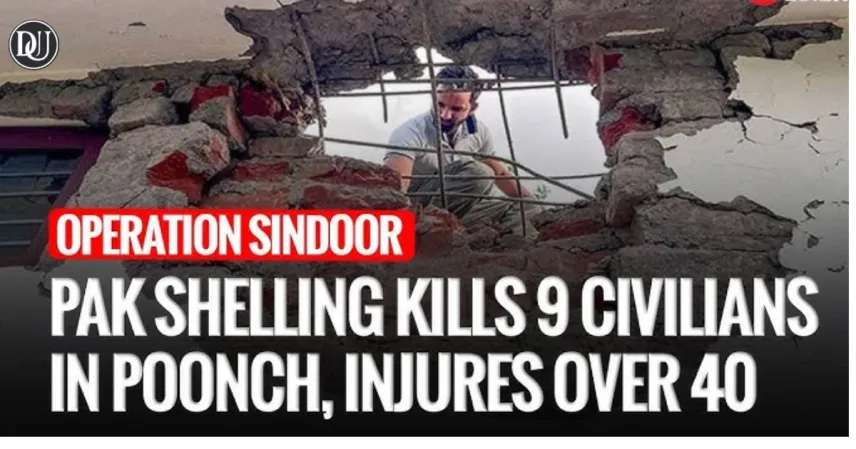India-Pakistan Tensions Escalate: Operation Sindoor and Deadly Crossfire in Kashmir
Amid growing hostilities between India and Pakistan, tensions in Kashmir have escalated dramatically following a series of military strikes and artillery exchanges. On May 8, 2025, India launched Operation Sindoor in retaliation for the deadly Poonch attack, which left Indian tourists dead. This operation has further fueled the ongoing conflict between the two nuclear-armed neighbors, causing devastation in both Indian-administered and Pakistan-administered Kashmir.
![]()
Operation Sindoor: A Coordinated Strike
In response to the Poonch attack on April 22, where five Indian tourists were killed, India initiated a major military operation, Operation Sindoor, targeting terror camps in Pakistan and Pakistan-occupied Kashmir. The strikes, which involved 24 missile attacks within a 25-minute window, targeted nine camps, including locations in Bahawalpur and Muridke—areas known for housing militant groups. India claimed that around 70 militants were killed in the precision strikes, which have been described as one of the most significant military actions in the region in recent years.
India’s defense officials emphasized that the operation was in retaliation for the Poonch attack, which they claimed was planned by Pakistan-based militant groups. The Indian government’s decision to take such direct action was supported by calls for a firm response to ongoing cross-border terrorism emanating from Pakistan. The operation was intended to neutralize terror elements in a show of strength and to send a clear message to Pakistan about India’s zero-tolerance policy toward terrorism in the wake of the Poonch attack.
![]()
Pakistan’s Retaliation
As expected, Pakistan swiftly responded with artillery shelling across the Line of Control (LoC) in the Kashmir region, intensifying the violence. Pakistani forces fired heavy artillery into Indian territories, including areas like Poonch and Uri, in direct retaliation for the Poonch attack, resulting in civilian casualties. The shelling, described as the heaviest in over four decades, led to the deaths of at least 11 civilians, including children and shopkeepers. Indian forces retaliated, with both sides suffering significant losses.
The situation has left Kashmiris caught in the middle of the deadly crossfire, with residents in towns like Poonch and Uri reporting destruction to homes and infrastructure. Many civilians have been forced to flee their homes, seeking refuge from the continuous shelling. Local voices, however, have emphasized that the people of Kashmir do not wish for war and are suffering from the consequences of a conflict not of their making. The Poonch attack has only added to the growing anger and frustration among residents who are desperate for peace.
Kashmiris’ Plea for Peace
As both India and Pakistan exchange artillery fire, civilians in Kashmir have expressed their desire for peace. In interviews with locals, many residents highlighted that they were fed up with the ongoing violence, with some saying they had “no interest in war.” Locals in Poonch described the heavy bombardment as the worst they had ever experienced, urging both governments to engage in dialogue to prevent further destruction. The region, already battered by decades of conflict, continues to bear the brunt of this geopolitical struggle, with children and families caught in the middle, especially in the aftermath of the Poonch attack.
Global Reactions and Calls for De-Escalation
The international community has voiced concerns about the escalating tensions, with calls for de-escalation from major world powers. As the Poonch attack continues to reverberate across the region, global leaders have expressed concern over the potential for further violence. U.S. President Donald Trump and U.K. Prime Minister Keir Starmer have both urged India and Pakistan to exercise restraint and avoid further military engagement. There are growing fears that the situation could spiral out of control, leading to a wider regional conflict.
![]()
The United Nations and several other organizations have called for an immediate ceasefire and diplomatic talks to address the underlying issues that fuel the ongoing Kashmir conflict, which was exacerbated by the Poonch attack. However, with military operations underway and emotions running high on both sides, a resolution remains elusive.
Conclusion: A Dangerous Escalation
The ongoing escalation between India and Pakistan presents a grave challenge to the region’s stability. With Operation Sindoor intensifying military operations on both sides and civilians bearing the brunt of the violence, the Poonch attack has become a critical moment in this ongoing conflict. Kashmir remains a flashpoint in the broader India-Pakistan rivalry. As both countries continue to engage in tit-for-tat strikes, the prospects for peace seem increasingly distant. What is clear, however, is that the civilians of Kashmir are desperate for an end to the violence and a return to stability—something that may require international mediation and dialogue, something that remains uncertain as the conflict continues to unfold, particularly in the wake of the Poonch attack.










